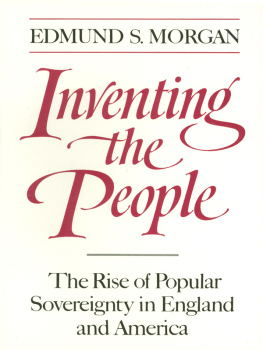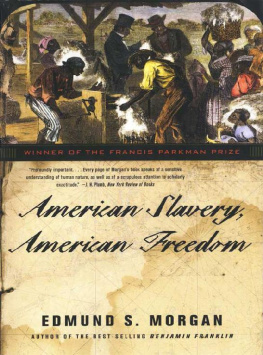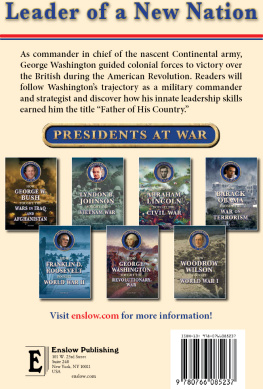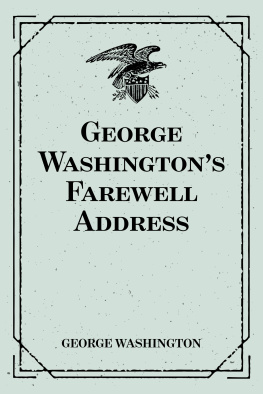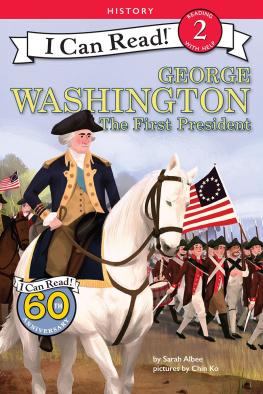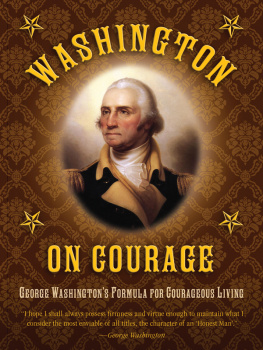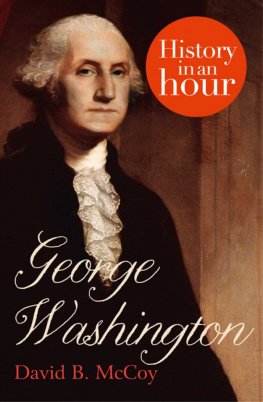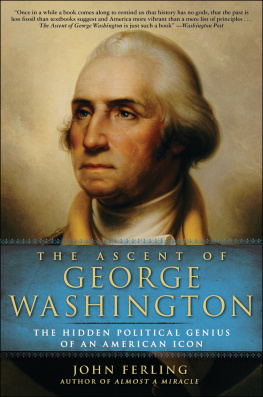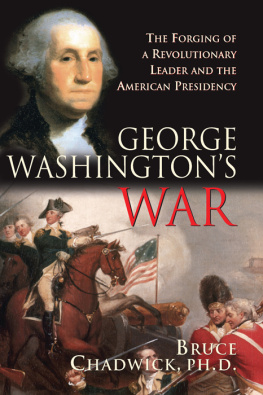ACKNOWLEDGEMENTS
The Houdon bust of Washington, photograph through the Courtesy of the Mount Vernon Ladies Association of the Union.
NOTES
1. Silas Deane to Elizabeth Deane, July 1, 1775, in Paul H. Smith, ed., Letters of Delegates to Congress 1774-1789 (Washington, D.C., 1976- ), I, 567.
2. David Ramsay, The History of the American Revolution (Philadelphia, 1789), II, 316.
3. Max Farrand, ed., The Records of the Federal Convention of 1787 (New Haven, 1911), III, 85-86.
4. To William Woodford, November 10, 1775, John C. Fitzpatrick, ed., The Writings of George Washington from the Original Manuscript Sources, 1745-1799 (Washington, D.C., 1931-44), IV, 80-81. Subsequent references, unless otherwise indicated, are to volumes of this work.
5. To William Pearce, December 18, 1793, XXXIII, 191.
6. To Thomas Nelson, September 2, 1777, IX, 164.
7. To de Grasse, September 25, 1781, XXIII, 136-39; cf. to Noah Webster, July 31, 1788, XXX, 26-28.
8. To the President of Congress, September 13, 1777, IX, 215.
9. To Henry Laurens, October 3, 1778, XIII, 15.
10. To the President of Congress, December 22, 1777, X, 186. Cf. to same, August 10, September 13, 1777, IX, 46, 215; to Lafayette, May 18, 1778, XI, 419.
11. To the President of Congress, August 20, 1780, XIX, 408-409.
12. To same, February 18, 1776, IV, 336; to Patrick Henry, November 13, 1777, X, 52.
13. His views on this subject are most explicit in various letters to Bryan Fairfax and George William Fairfax in the summer of 1774, III, 221-42; to Bryan Fairfax, March 1, 1778, X, 2-5; and to George William Fairfax, July 10, 1783, XXVII, 57-60.
14. To Joseph Reed, January 31, 1776, IV, 297.
15. To Lewis Nicola, May 22, 1782, XXIV, 272. Cf. to John Jay, August 1, 1786, XXVIII, 503.
16. To Sir Edward Newenham, November 25, 1785, XXVIII, 323.
17. To the President of Congress, November 11, 1778, XIII, 223-44.
18. To Henry Laurens, November 14, 1778, XIII, 254-57.
19. To Fielding Lewis, July 6, 1780, XIX, 131. Cf. to Thomas Jefferson, August 14, 1780, to the President of Congress, August 20, 1780, XIX, 373-75, 408-411; to John Mathews, October 4, 1780, to John Cadwalader, October 5, 1780, Circular to the States, October 18, 1780, to George Mason, October 22, 1780, to William Fitzhugh, October 22, 1780, to Benjamin Lincoln, December 11, 1780, XX, 113-16, 122-23, 206-211, 242, 246-47, 461; to John Parke Custis, February 28, 1781, to William Fitzhugh, March 25, 1781, XXI, 319, 374-77; to Fielding Lewis, June 28, 1781, to William Fitzhugh, August 8, 1781, XXII, 282-83, 480-81.
20. To the Committee of Cooperation, June 11, 1780, XVIII, 505; to Jonathan Trumbull, June 27, 1780, to Daniel Brodhead, July 4, 1780, XIX, 81-82, 119; to the President of Congress, September 15, 1780, Circular to the States, October 18, 1780, XX, 49-52, 205.
21. To John Laurens, January 15, April 9, 1781, XXI, 109, 438-39.
22. Washington had confided to William Fitzhugh, on March 25, 1781, that the war is like to become a War of finance, and that no funds within our reach can support it long. XXI, 375.
23. To Joseph Reed, May 28, 1780, XVIII, 436-37.
24. To James McHenry, August 22, 1785, XXVIII, 227-30.
25. To William Grayson, August 22, 1785, XXVIII, 233-34.
26. To Joseph Reed, July 4, 1780, XIX, 114.
27. To Henry Lee, October 31, 1786, XXIX, 34.
28. To James Madison, November 5, 1786, XXIX, 52.
29. To Benjamin Lincoln, March 23, 1787, XXIX, 181-82.
30. To John Augustine Washington, June 15, 1783, XXVII, 13.
31. To James Duane, April 10, 1785, XXVIII, 124.
32. To Patrick Henry, October 9, 1795, XXXIV, 335; to Thomas Jefferson, July 6, to Charles Cotesworth Pinckney, July 8, 1796, XXXV, 120, 129.
33. To Catharine Macaulay Graham, he explained that his wifes wishes coincide with my own as to simplicity of dress, and everything which can tend to support propriety of character without partaking of the follies of luxury and ostentation. January 9, 1790, XXX, 498. Cf. to David Stuart, July 26, 1789, XXX, 359-63.
34. In his suppression of the Whiskey Rebellion in western Pennsylvania, Washington was particularly concerned to show to Europeans how firmly the United States government could act. After it was over he wrote to Edmund Pendleton (January 22, 1795, XXXIV, 98-99): I hope, and believe, that the spirit of anarchy in the western counties of this State (to quell which the force of the Union was called for) is entirely subdued; and altho to effect it, the community has been saddled with a considerable expence, yet I trust no money could have been more advantageously expended; both as it respects the internal peace and welfare of this country, and the impression it will make on others. The spirit with which the Militia turned out, in support of the Constitution, and the laws of our country, at the same time that it does them immortal honor, is the most conclusive refutation that could have been given to the assertions of Lord Sheffield, and the prediction of others of his cast, that without the protection of Great Britain, we should be unable to govern ourselves; and would soon be involved in anarchy and confusion. They will see that republicanism is not the phantom of a deluded imagination: on the contrary, that under no form of government, will laws be better supported, liberty and property better secured, or happiness be more effectually dispensed to mankind.
35. To the Members of the Volunteer Association and other inhabitants of the Kingdom of Ireland who have lately arrived in the City of New York, December 2, 1783, XXVII, 253-54; to Lucretia Wilhelmina Van Winter, March 30, to David Humphreys, July 25, to Lafayette, July 25, 1785, XXVIII, 119-20, 202-203, 206; to Thomas Jefferson, January 1, to John Armstrong, April 25, 1788, XXIX, 350-51, 467.
36. James Madison expressed Washingtons views well when Washington had him draft a farewell address (never used) at the end of Washingtons first term. Madison would have had Washington observe that Nations as well as individuals, act for their own benefit, and not for the benefit of others, unless both interests happen to be assimilated (and when that is the case there requires no contract to bind them together). (XXXV, 57) In other words, treaties were feasible only when the interests of both parties coincided and when that was the case a treaty was scarcely needed except to give form to relationships. Washington sent this passage to Hamilton along with some others from Madisons draft for use in the address that Hamilton drafted at the end of Washingtons second term, the draft that was actually used. But Hamilton did not work this observation into the final version.
37. To Gouverneur Morris, July 28, 1791, XXXI, 328. Cf. to same, March 25, 1793, XXXII, 402-403.
38. To Alexander Hamilton, July 13, to Edmund Randolph, July 22, 1795, XXXIV, 237-40, 244. Washington was convinced from the beginning that the British would retain the Northwest posts. To the President of Congress, August 22, 1785, to Lafayette, May 10, 1786, XXVIII, 231, 422-23.
39. During the 1780s Washington had been wary of insisting on the right to navigate the Mississippi, because he feared that if such a right were obtained it might attach the western settlers by commercial ties to the Spanish in New Orleans. In those years he devoted himself to fostering the construction of canals and waterways between the Ohio River and the James and the Potomac, with a view to binding the West to the East. He was convinced, in any case, that Whenever the new States become so populous and so extended to the westward, as really to need it, there will be no power which can deprive them of the use of the Mississippi. (To Henry Lee, June 18, 1786, XXVIII, 460). By 1789, however, though the canals were not completed, it was apparent that the western settlers might be pushed toward Spain, if the United States did



